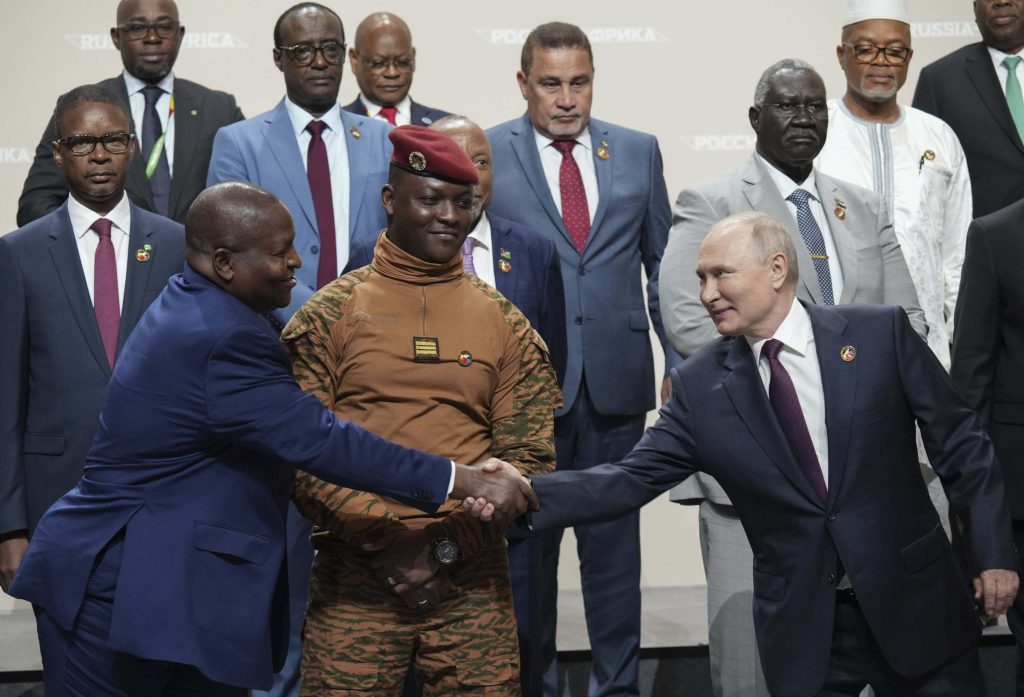
The world is headed for a major food crisis with Russia refusing to extend the Black Sea Grain Initiative. The Russian stand reflects its growing desperation owing to its failure to win war with Ukraine
The world is headed for a major food crisis as Moscow has refused to extend the Black Sea Grain Initiative, agreed to by the UN, Turkey and Russia in July 2022 following the Russia-Ukraine full-scale war that began on February 24 last year. African countries, in particular, are more perturbed than anyone else as the development may not only lead to an acute shortage of wheat and other food grains in the black continent but also make these commodities too costly to afford for the extremely poor people living in that part of the globe.
Therefore, some time back, African leaders came out with a proposal for ending the war that actually began in 2014, and averting the dangerous disruption of wheat export from Ukraine to different parts of the world.
Wheat supplies from Ukraine, one of the top 10 wheat producers of the world, serve as the lifeline for 79 countries, according to the International Rescue Committee. Experts believe that these countries would find it difficult to cope with the problems that might arise in
the absence of Ukrainian wheat supplies.
The African proposal came during a two-day Africa-Russia summit in the last week of July. But Russian President Vladimir Putin was adamant. Instead of making any commitment on extending the UN-brokered Black Sea Food Initiative, he promised to provide free wheat supply to the most needy countries of Africa. To assuage the feelings of the African
leaders, he assured them to “examine” their proposals, but with the assertion that ships passing through the Black Sea would henceforth be bombed for sure.
The Russian stand is that loaded ships entering the Black Sea would now be treated as if these were carrying weapons for Ukraine.
But very few countries have taken President Putin’s otherwise high-sounding assurance very seriously: “Our country will continue supporting needy states and regions, in particular, with its humanitarian deliveries. We seek to actively participate in building a fairer system of distribution of resources. We are making maximum efforts to avert a global food crisis.”
Some of the African leaders at the St Petersburg conference told Putin clearly that they were there not to beg for anything. They were primarily interested in an end to the war, which would ultimately lead to the normalisation of food grain supplies through the Black Sea.
Putin’s arguments in support of his desperate stand could not convince the world community as foolproof arrangements were there to supervise the loading and unloading of ships, which would pass through the Bosporus Strait under Turkish control to reach the Black Sea and then to their actual destinations.
Another summit to avert the feared food crisis was called in August by Ukraine and sponsored by Saudi Arabia, but Russia was not invited. As expected, it ended in a fiasco, but highlighted the growing anxiety of the world with the war showing no sign of coming to an end and the Black Sea Initiative having been dumped in the dustbin of history.
The truth is that Russia does not want Ukraine to use the Black Sea route to export its grains to the world’s needy countries, which had been depending on Ukrainian supplies for years. Moscow has provided proof of this intention as Putin has claimed that his country is going to have a bumper wheat crop this year and can replace the supplies from Ukraine.
He tried to comfort African leaders, though unconvincingly, that “our country can replace Ukrainian grain, both on a commercial basis and as grant-in-aid to the neediest African countries, more so since we expect another record harvest this year.” The US and other western countries, however, assert that this is not based on truth.
Russia, in fact, adopted go-slow tactics much before it finally ended the Black Sea deal. Till the end of last year over 10 ship inspections were done every day, but this came down to two in May allegedly as a result of Russian non-cooperation. The UN has claimed that it has the capacity to inspect as many as 40 ships a day, but this is not acceptable to Russia.
Putin has stated that he had to withdraw from the Black Sea deal because the sanctions imposed on Russia’s grain exports and related activities had not been lifted by the West, resulting in ship insurers demanding more than the normal premium. But he does not make it clear that lifting of the sanctions was part of the export deal.
The Black Sea Initiative was, no doubt, an excellent arrangement to ensure that the Russia-Ukraine war did not affect the food supply arrangements finalised to help the world’s poor countries. It had come to the rescue of not only a number of needy African nations, but also countries like Afghanistan. The deal had led to international wheat prices, which had shot up considerably after Russia declared full-scale war on Ukraine, stabilising at $800 per tonne from $1,360 per tonne.
USAid chief Samantha Power has described the Russian excuse to end the deal as a “life and death decision” not based on truth. It was full of “falsehood and lies” and could jeopardise the lives of millions of the world’s poorest of the poor living in the least developed countries like Bangladesh, Afghanistan, Sudan and Somalia.
The Russian stand, reflecting its growing desperation owing to its failure to win the war as it expected, is being interpreted as its ultimate strategy to use the disruption of food supplies as a weapon. President Putin, perhaps, believes that this is how he can force the western countries and others supporting Ukraine to accept Russian conditions to end the war, including a guarantee that Ukraine will never join the NATO bloc and the annexed Crimea region will remain a part of Russia. Ukraine and its western allies, as expected, have straightaway rejected these “unreasonable” demands.
Now since the Black Sea deal remains a thing of the past, Ukraine has begun to use the land route to export its wheat and other grains. Since this route passes through European Union territories, it has caused uneasiness among the farmers in Europe because the prices of their wheat are crashing owing to its increased availability there. The EU as a bloc is the world’s largest wheat producer after China.
Therefore, with a view to protecting the interests of the EU farmers, the EU authorities have allowed five member-countries – Bulgaria, Hungary, Poland, Romania and Slovakia – to ban the sale of Ukrainian wheat, corn, rapeseed and sunflower seeds in their areas while allowing the transit of these commodities to other destinations. However, the fact remains that the land route can never be a replacement for the sea route.












